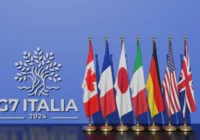In an increasingly risky world, we need to analyze the rhetoric of risk, especially when used by politicians and generals. The Daily Devil’s Dictionary explains.
Experts in the world of business deem risk analysis to be one of the most important, if not the most important factor in decision-making. Risks are worth taking, but only if the expected gains are likely to negate the risk.
For the military, risk analysis has a different character. It focuses on making decisions on the short term: the battlefield. Officers are trained to evaluate the risk of different types of operations in the context of battle and assess the potential for risk reduction when deploying their range of available resources: human and material, soldiers and weaponry.
When it comes to budgets for the military, we find ourselves in a different world altogether, where neither the logic of business risk nor battlefield strategy are at play. It is the world of politics, where what was real in another context inevitably becomes hyperreal, if not surreal.
The designated next commander of US Central Command, Lieutenant General Kenneth McKenzie, has stated, concerning next year’s military budget, that “Anything below $733 [billion] would increase risk and that risk would be manifested across the force.”
Here is today’s 3D definition:
Risk:
The element of uncertainty that exists in human decision-making, largely because human actions take place in a continuum we call time and no one controls the future, which means that, because risk can never be eliminated, whatever budget your masters grant you today will never be enough
Contextual note
The business approach to risk focuses on the abstraction of money — profit and loss — in contrast to the military’s concrete calculation of damage to lives and equipment. The financial focus of business risk analysis differs so radically from military risk analysis that the two should be deemed to belong to two highly contrasted cultures with very little overlap between them.
Then there’s politics, where it would be fair to say that the notion of risk loses all its substantial meaning, serving mainly rhetorical purposes, leading us into hyperreality. The new commander, McKenzie, appears to be involved in a purely political game, doing the bidding of two Republican senators unhappy with President Donald Trump’s announced intention to slash all government programs by 5%, including defense. For true conservatives this is a mortal sin, especially for those representing states that are heavy beneficiaries of defense contracts.
The senators see “danger,” which McKenzie then translates as risk. “Both lawmakers argued in an op-ed last week that the 5 percent cut would be dangerous and would degrade the military after two years of budget hikes aimed at rebuilding,” reports journalist Travis J. Tritten.
McKenzie justifies his demand with this explanation: “We are in the process now, very carefully across the department, examining the details of what the nature of that risk would be.” In business, a manager who says he or she is “in the process,” even with the claim of acting “carefully,” would be told to come back with some real figures, not the expression of good intentions. Shareholders’ investment and sacrosanct share price are at stake and must be respected, unlike taxpayer contribution, which can always be counted on to unquestioningly “honor the troops.”
Historical note
The entire debate has become hyperreal. Trump bloated the defense budget last year and is now willing to slash it. To justify the expansion of the budget, he explained: “It’s defense. It’s very important.” Which translates as: It isn’t something unimportant like health, education, safety or reliable infrastructure. But now, ready to reduce the defense budget in the name of consistency (all budgets will be slashed), Trump says, “The U.S. spent 716 Billion Dollars this year. Crazy!” Can defense be both important and crazy? Doesn’t “crazy” mean there’s something to worry about?
 But it gets crazier. “I am certain that, at some time in the future, President Xi [Jinping] and I, together with President [Vladimir] Putin of Russia, will start talking about a meaningful halt to what has become a major and uncontrollable Arms Race,” Trump said. This is the president who has announced that he is canceling a treaty with Russia that limits the production of intermediate nuclear weapons, a threat that has already led to counter-threats from Russia to accelerate the arms race.
But it gets crazier. “I am certain that, at some time in the future, President Xi [Jinping] and I, together with President [Vladimir] Putin of Russia, will start talking about a meaningful halt to what has become a major and uncontrollable Arms Race,” Trump said. This is the president who has announced that he is canceling a treaty with Russia that limits the production of intermediate nuclear weapons, a threat that has already led to counter-threats from Russia to accelerate the arms race.
The public may still be wondering how the risk associated with the $21 trillion that remain unaccounted for in defense spending over the past 19 years was assessed. The sad truth is that nothing was assessed, neither expenditure within the budget, nor the risks.
Reporting on this scandal (still officially considered a mere anomaly) in 2016, Reuters quotes Franklin Spinney, a retired military analyst for the Pentagon: “Where is the money going? Nobody knows.” The article continues: “An accurate accounting could reveal deeper problems in how the Defense Department spends its money.”
Let’s now go back to McKenzie’s assertion: “We are in the process now, very carefully across the department, examining the details of what the nature of that risk would be.” In light of recent history, is there any reason to trust the seriousness of his claim?
*[In the age of Oscar Wilde and Mark Twain, another American wit, the journalist Ambrose Bierce, produced a series of satirical definitions of commonly used terms, throwing light on their hidden meanings in real discourse. Bierce eventually collected and published them as a book, The Devil’s Dictionary, in 1911. We have shamelessly appropriated his title in the interest of continuing his wholesome pedagogical effort to enlighten generations of readers of the news.]
The views expressed in this article are the author’s own and do not necessarily reflect Fair Observer’s editorial policy.
Support Fair Observer
We rely on your support for our independence, diversity and quality.
For more than 10 years, Fair Observer has been free, fair and independent. No billionaire owns us, no advertisers control us. We are a reader-supported nonprofit. Unlike many other publications, we keep our content free for readers regardless of where they live or whether they can afford to pay. We have no paywalls and no ads.
In the post-truth era of fake news, echo chambers and filter bubbles, we publish a plurality of perspectives from around the world. Anyone can publish with us, but everyone goes through a rigorous editorial process. So, you get fact-checked, well-reasoned content instead of noise.
We publish 2,500+ voices from 90+ countries. We also conduct education and training programs
on subjects ranging from digital media and journalism to writing and critical thinking. This
doesn’t come cheap. Servers, editors, trainers and web developers cost
money.
Please consider supporting us on a regular basis as a recurring donor or a
sustaining member.
Will you support FO’s journalism?
We rely on your support for our independence, diversity and quality.






